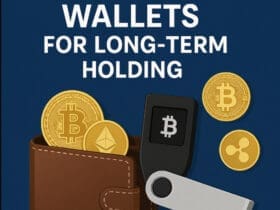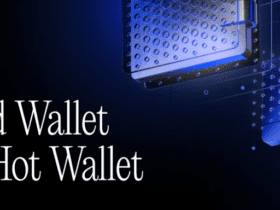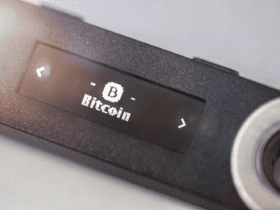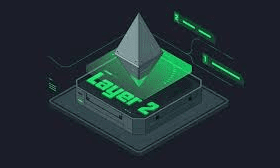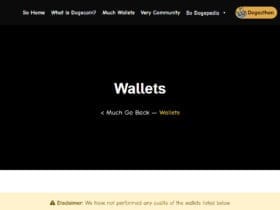What is a Polygon Wallet?
A Polygon wallet is a digital tool that helps you store, send and receive MATIC tokens and other cryptocurrencies on the Polygon network. It works like other blockchain wallets, but is specialized for Polygon optimized transaction speed and low fees, as well as Layer 2 scaling.
Polygon wallets, whether software, hardware or web-based, provide secure access to dApps, staking and NFT management. They are critical for safe and efficient use within the Polygon ecosystem.
How to Choose the Right Polygon Wallet
Here are the steps to take to ensure that you choose the correct Polygon wallet for your use:
Security Features
Polygon wallets should have stiff encryption easures, private key control, and tw certificate security.
Compatibility
Ensure that you check the wallet for s Polygon (MATIC) and any other tokens that you plan on using.
User Experience
Ensure that the wallets you have picked have user friendly ways of interacting with the wal.
Backup & Recovery
Make sure that the wallet has strong reliable seed recovery mechanisms in case you misplace your device.
Integration with dApps
Choose wallets that enable you to interact with Polygon dApps with ease.
Reputation & Support
Check that the wallets selected have good community support, reviews and customer service responsiveness.
Key Table
| Wallet Name | Type | Key Features / Strengths | Polygon Support | Notes / Extra Info |
|---|---|---|---|---|
| Zengo | Keyless Wallet | Strong security, easy user experience | Limited | Keyless design eliminates private key risks |
| MetaMask | Browser & Mobile | Supports Ethereum & Polygon dApps, widely used | Yes | Popular for DeFi and NFT interaction |
| Trust Wallet | Mobile Wallet | Multi-chain support, built-in dApp browser | Yes | Supports many blockchains |
| Ledger Nano X | Hardware Wallet | Top-tier security, offline storage | Yes | Supports multiple crypto assets |
| Trezor Safe 5 | Hardware Wallet | Secure offline key storage, multi-asset support | Yes | Ideal for long-term cold storage |
| Exodus Wallet | Desktop & Mobile | User-friendly, built-in exchange features | Yes | Great for beginners |
| Coinbase Wallet | Mobile Wallet | Easy access to Polygon tokens and dApps | Yes | Integrated with Coinbase ecosystem |
| Kraken Wallet | Exchange Wallet | Strong security, Polygon support | Yes | Connected to Kraken exchange |
| Binance Wallet | Exchange Wallet | Seamless Polygon transactions within Binance ecosystem | Yes | Integrated with Binance ecosystem |
| Ledger Flex | Hardware Wallet | Multi-chain support, secure and flexible crypto management | Yes | Designed for advanced users |
1. Zengo Wallet
The wallet is non-custodial and used on Android and iOS devices. Zengo uses Mobile-first strategy. Rather than using seed phrases, Zengo uses Multi-Party Computation (MPC) so it is intuitive and secure.
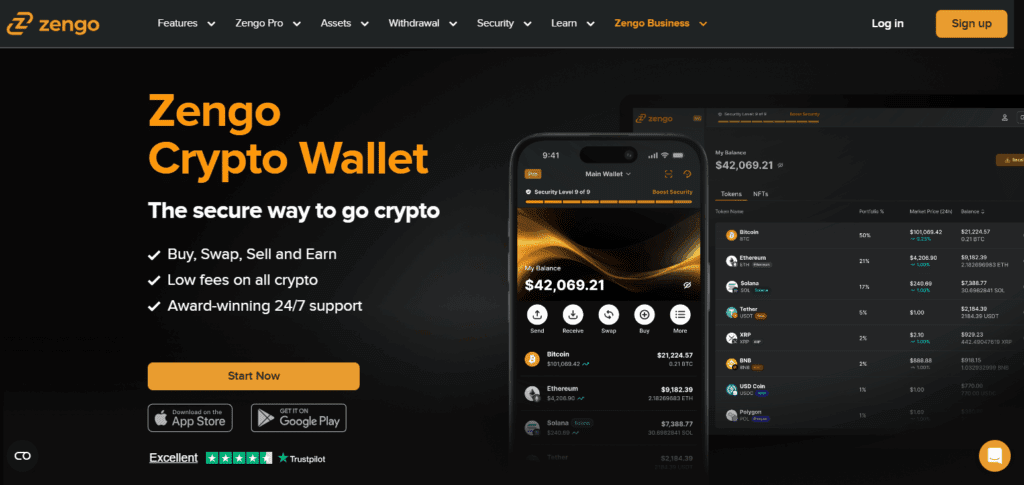
Zengo supports Polygon, Ethereum, Bitcoin, Dogecoin, and Tezos, along with tokens like MATIC, USDC, and USDT. Zengo Wallet excels in keeping Polygon assets, providing spam NFT filtering, and low transaction fees.
It has no support for hardware wallets, which is a significant drawback. Zengo is not open-source but does provide free token transfers (exluding network costs). If you value convenience and low risk while navigating the Polygon ecosystem, Zengo is a premier choice.
Zengo Wallet Features
- MPC security (no seed phrase)
- Biometric authentication
- Supports Polygon, Ethereum, Bitcoin, Tezos
- iOS and Android app
- Built-in Web3 firewall
Pros:
- Extremely beginner-friendly
- No risk of seed phrase loss
- Fast onboarding and recovery
- Spam NFT protection
Cons:
- No hardware wallet support
- Not open-source
- Limited DeFi integrations
2. MetaMask
MetaMask is a popular browser extension and mobile wallet. MetaMask supports multiple chains like Polygon, Optimism, Arbitrum, and zkEVM. Users can hold, swap, and interact with dApps using tokens like MATIC, DAI, and USDC. MetaMask is compatible with hardware wallets like Ledger and Trezor, which increases security for more experienced users.
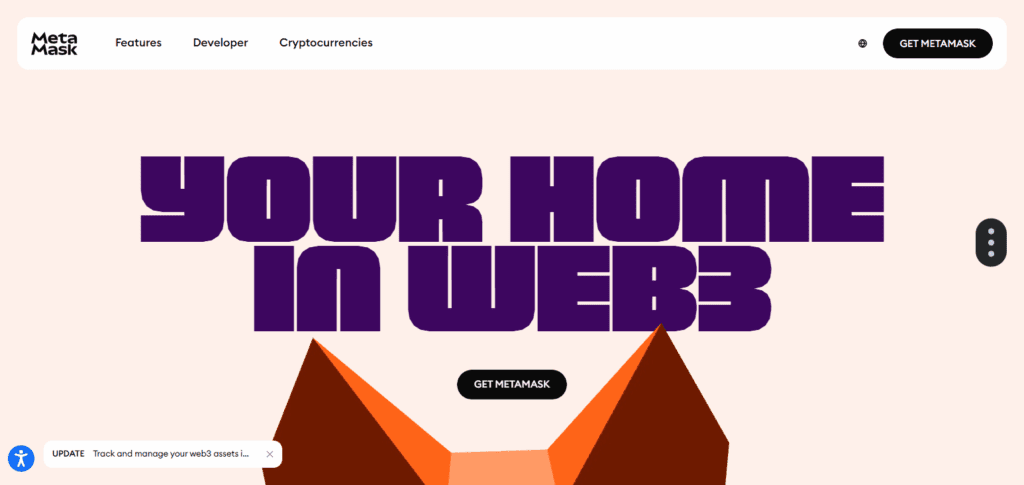
Though it is partially closed-source, the codebase is open to some degree. There are also fee discounts for native swaps and bridges. MetaMask is one of the top wallets for Polygon thanks to its dApp and multi-chain wallet capabilities. Users in DeFi and NFTs value MetaMask highly.
MetaMask Features
- Browser extension + mobile app
- Supports EVM chains: Polygon, Ethereum, Arbitrum
- dApp browser and token swaps
- Hardware wallet integration (Ledger, Trezor)
Pros:
- Deep DeFi and NFT ecosystem access
- Custom RPC for any EVM chain
- Widely supported by dApps
Cons:
- UI can be complex for beginners
- Not fully open-source
- Gas fees can be high without Layer 2
3. Trust Wallet
Trust Wallet is a multi-chain mobile wallet. It is non-custodial and supports over 70 blockchains such as Polygon, Ethereum, Solana, and BNB Chain. It also manages millions of tokens and NFTs like MATIC, USDT, and DAI.
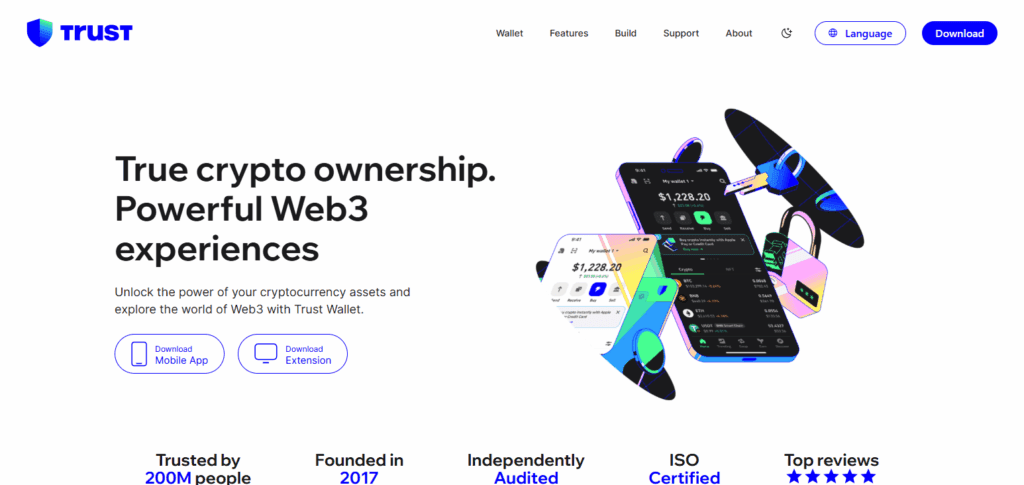
Trust Wallet provides WalletConnect integration with Ledger hardware wallets, which is the only direct support. Trust Wallet is open-source and in-app swaps and staking to fee discounts.
Trust Wallet is one of the best wallets for Polygon, as it is mobile-friendly and provides easy access to DeFi, NFTs, dApps, and comprehensive private key control with a simple interface.
Trust Wallet Feature
- Mobile-only wallet
- Supports 70+ blockchains including Polygon
- Built-in DEX and staking
- NFT and token management
Pros:
- Open-source and community-driven
- Easy access to DeFi and NFTs
- Lightweight and fast
Cons:
- Limited hardware wallet support
- No desktop version
- Occasional token syncing issues
4. Ledger Nano X
Ledger Nano X is a top-grade hardware wallet that assists 5,500+ tokens, including Ethereum, Polygon, and Solana, and their derived tokens. It connects through Bluetooth or USB-C interfaces for desktop and mobile apps, including Ledger Live and MetaMask.
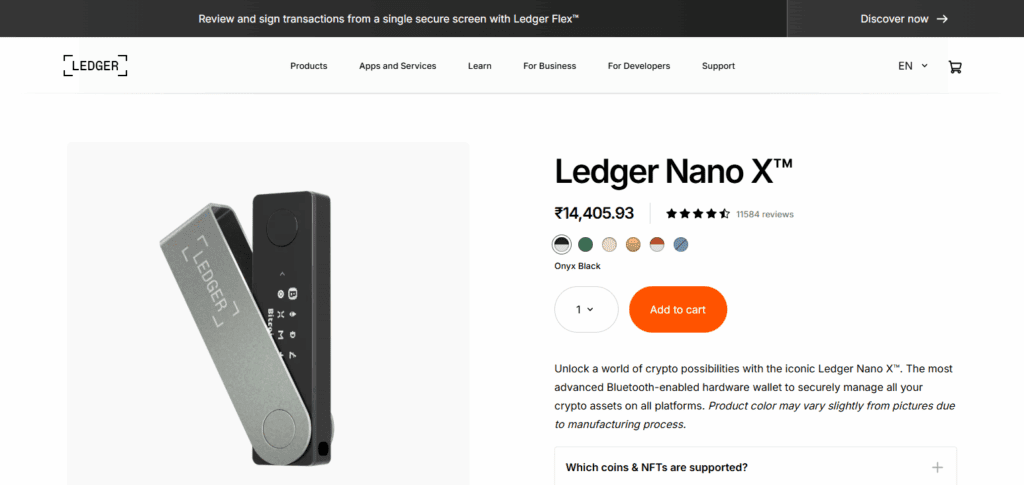
Users can conveniently and securely store tokens like MATIC and other Polygon tokens offline. Fee reductions via integrated swaps and staking, and open-source firmware, provide both Ledger Nano X and Polygon unmatched cold storage security as top DeFi wallets, ideal for serious long-term holders.
Ledger Nano X Features
- Wallet that supports Bluetooth
- Currencies supported: MATIC along with 5,500+ tokens
- Compatible with MetaMask and Ledger Live
- Cold storage storage system
Pros
- Portable and long-lasting
- Comprehensive wallet selection
- Top-tier security
Cons
- Complex for beginner users
- Not suited for frequent traders
- Physical device needed
5. Trezor Safe 5
Trezor Safe 5 is a next-gen hardware wallet that supports 9,000+ tokens including Polygon, Ethereum, and Bitcoin, and features a color touchscreen, haptic feedback, and EAL6+ Secure Element chip.
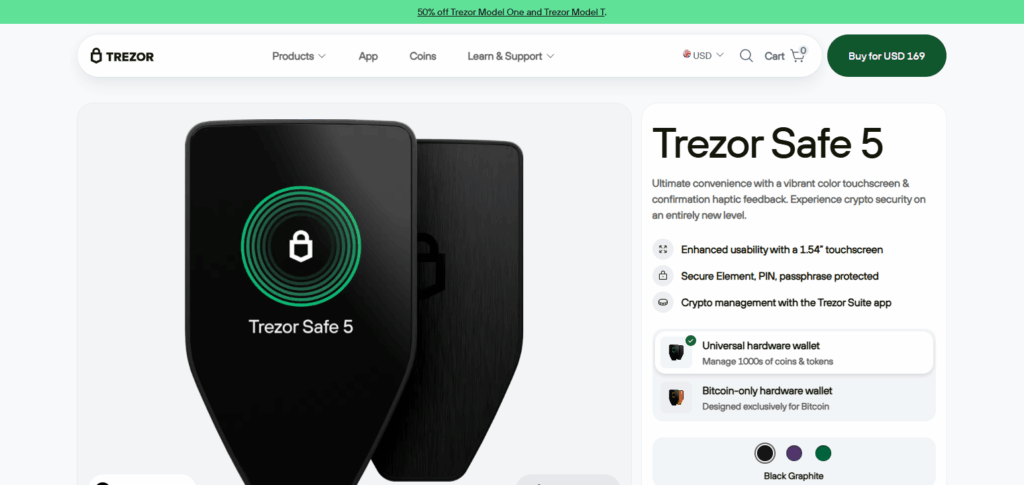
It works with Trezor Suite and third-party wallets like MetaMask and Tor, and Coin Control-enabled privacy tools providing advanced backup options.
Fee reductions through staking and swaps, along with complete open-sourcing, enable Trezor Safe 5 to maintain its position as a leading Polygon wallet. Trezor Safe 5 is ideal for users who value strong usability with robust privacy control that merges security to ease.
Trezor Safe 5 Features
- Touchscreen hardware wallet
- EAL6+ Secure Element chip
- 9,000+ tokens
- Usable with Trezor Suite and MetaMask
Pros:
- Completely open-source
- Privacy (Tor, Coin Control)
- Fantastic backup and recovery options
Cons:
- Absence of a mobile app
- Absence of native support for Polygon dApps
- Somewhat expensive
6. Exodus Wallet
Exodus Wallet is a great multi-platform wallet that is available on the desktop, browser, and mobile. With Exodus, you can manage, stake, and do in-app swaps on MATIC, NFTs, and many other tokens.
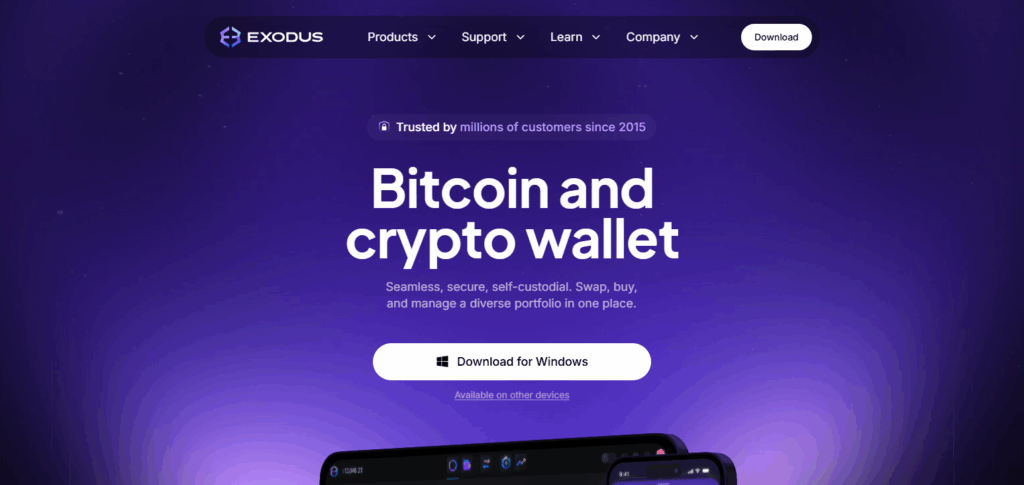
Exodus Wallet is one of the top Polygon wallets. Although Exodus wallet isn’t fully open-sourced, it does offer some level of privacy and transparency. This wallet is great for beginners and experienced traders as it integrates a sleak design with multi-chain access.
Exodus Wallet supports 335 assets, which include Polygon, Algorand, etc. This multi-use wallet integrates with Trezor for hardware support. Exodus Wallet comes with some great features, including built-in DEX aggregation and fiat on-ramps.
Exodus Wallet Features
- Standalone software with desktop, mobile, and browser versions
- 335+ assets including Polygon
- Built-in DEX with staking
- Trezor for hardware wallet security
Pros:
- Beautiful design and user interface
- Easy to use across different devices
- Perfect for beginners and casual traders
Cons:
- Not fully open-source
- Basic DeFi functions
- Does not support Ledger wallets
7. Coinbase Wallet
Coinbase Wallet is designed for EVM chain users, supporting Polygon, Optimism, Ethereum, and more. Coinbase Wallet can be a great Polygon wallet since it allows users to store MATIC, USDC, DAI, and also use dApps like OpenSea and Aave.
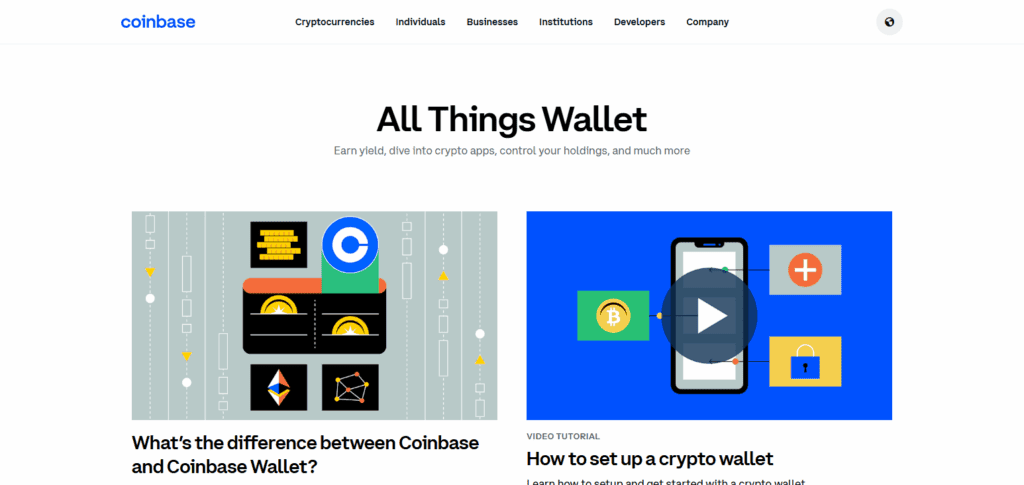
Coinbase Wallet is great for Polygon users. Users who do not use any hardware wallets can use WalletLink and the secure bridge as a great integration.
Coinbase Wallet features a robust Polygon wallet integration, enabling users to utilize Layer 2 networks and conduct in-app swaps at a reduced fee. This wallet is ideal for users already within the Coinbase ecosystem, thanks to its simplified DeFi features.—
Coinbase Wallet Features
- Mobile and browser wallet
- EVM chains including Polygon
- dApps and token swaps
- WalletLink and bridge integrations
Pros:
- No hassle linking to the Coinbase exchange
- Simplified process for new users to register
- Supports NFTs and other DeFi products
Cons.
- No Hardware wallet access
- Open source is limited
- Controls for privacy are minimal.
8. Kraken Wallet
The Kraken Wallet is exclusively for mobile devices, and is a completely free, open-source application with the ability to four, on over 2,000 assets on Ethereum, Polygon, Solana, Arbitrum, and more.
Users with Kraken Wallets are able to manage their MATIC, NFTs, Defi positions with crypto biometric safes and with backups that are encrypt. It manages Kraken accounts, so although there is no ability for hardware wallets, Kraken users are able to transfer assets without hassle.
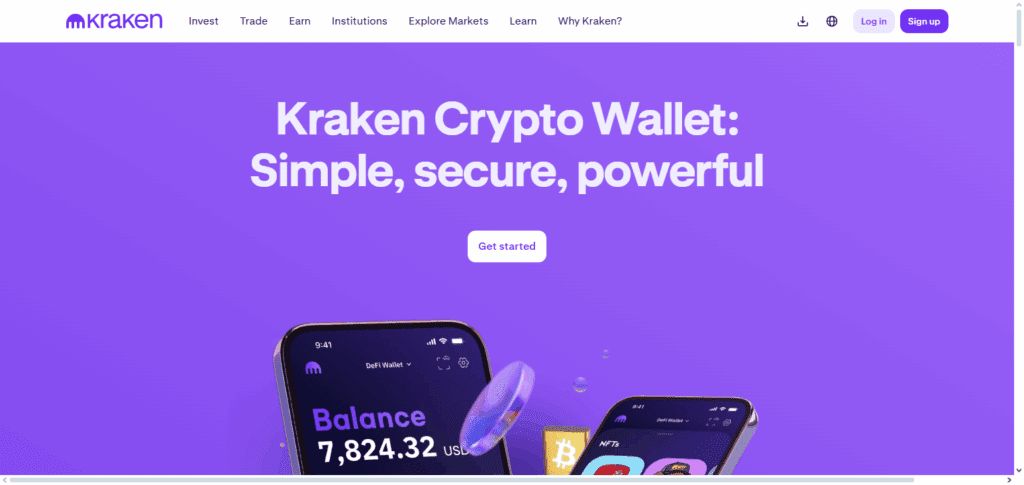
Fees for Kraken Wallet can be lowered with staking and swap features. Kraken Wallet offers solid features which include a first privacy design and strong security.
Kraken Wallet is, however, considered the top wallet on Polygon, meaning that users will have a great experience as Kraken Wallet does not sacrifice usability for control.
Kraken Wallet Features
- Only the mobile app is available
- There are more than 2000 supported assets, including Polygon
- Encrypted backup with biometric security
- Open-source code base
Pros:
- Design that prioritizes privacy
- Smooth and quick performance
- Support for staking and swaps
Cons:
- Lack of hardware wallet support
- No desktop software available
- Lack of a dApp browser
9. Binance Wallet
The Binance Web3 Wallet’s polygons, Ethereum, BNB Chain, and Binance ancillaries, along with dozens of other EVM networks, are directly interoperable. Users can manage MATIC, USDT and thousands of other tokens due to Binance Wallet’s extensive infrastructure for seamless swaps, staking, and NFTs.
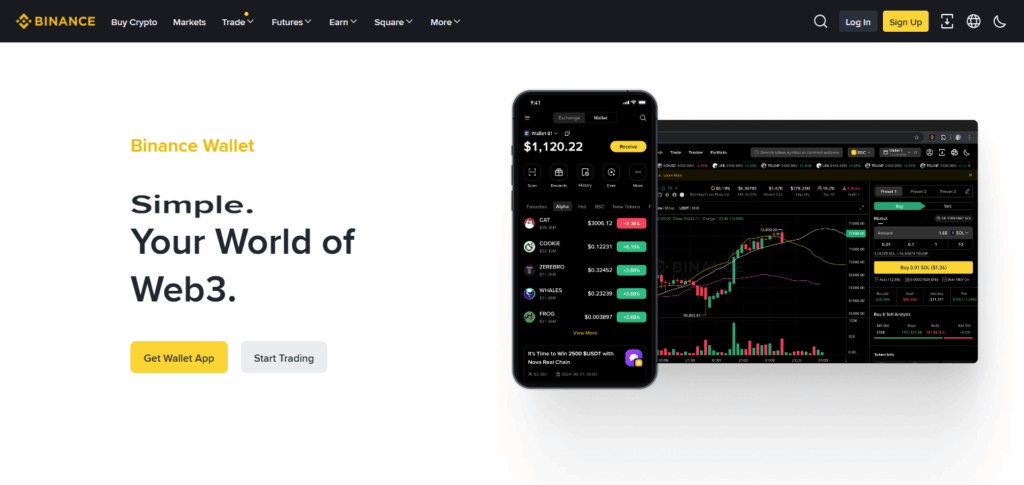
Ledger and Trezor hardware wallets are also supported using WalletConnect. Partially open-sourced, Binance Wallet offers reduced fees with cross-chain bridges and swaps priced lower.
As with other Polygon top wallets, Binance Wallet offers speedy access to the DeFi and presale trading tools, which are secure and multi-chain.
Binance Wallet Features
- A Web3 wallet that is part of the Binance ecosystem
- Support for Polygon, Ethereum and BNB Chain
- Wallet with built-in staking, swaps, NFT support, and hardware wallet WalletConnect
Pros:
- DeFi and trading tools accessible quickly
- Binance bridges for centralized fee reductions
- Support for multiple chains
Cons:
- Limited dApp browser
- Tied to a centralized exchange
- Open-source periphery
10. Ledger Flex
Ledger Flex has 15 000+ assets including Polygon, Ethereum, and Solana, since it is a hardware wallet it has a sleek design with a 2.84-inch E Ink touchscreen. Bluetooth, USB-C, and NFC connections enable it to interact with Ledger Live and other wallet applications.
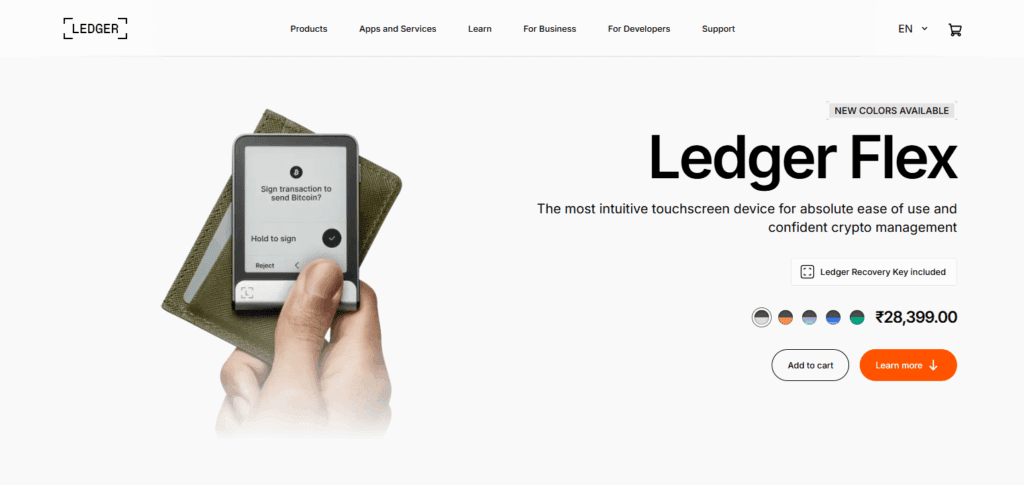
Users can store MATIC, NFTs, and tokens for offline staking. Ledger Flex is the top Polygon wallet due to its security, portability, and Ledger Live due to its open-sourced design and fee reductions from integrated swaps and staking.
These features allow the Flex to be a top deficit wallet due to the cold storage and more User friendly features.
Ledger Flex Features
- Hardware wallet with an E-Ink touchscreen
- Supports more than 15,000 assets, including Polygon
- USB-C, Bluetooth, and NFC
- Ledger Live and Metamask support
Pros:
- Sleek and compact for easy carrying
- Tokens and NFTs are stored in cold storage
- Open-source firmwre
Cons:
- Requires physical access
- Expensive
- The capacity to use native dAppsl is limited to supported dApps.
What Can You Do With a Polygon Wallet?
A Polygon wallet is your entry point into the entire POL-powered world. It not only stores tokens, but also allows for the sending and receiving of POL, claiming airdrops, and participating in DeFi protocols, including Aave, QuickSwap, and Balancer.
You can also stake POL for governance or reward, mint and trade NFTs, and use the Polygon Bridge to bring in assets from Ethereum.
Aside from these core functions, many wallets provide gas fee estimates, portfolio dashboards, and dApp discovery, making them a must-have for energetic users sailing through the dynamic waters of Polygon 2.0.
Types of Polygon (POL) Wallets
Mobile Wallets (e.g., Zengo, Trust Wallet): Ideal for quick access and convenient dApp use and swaps.
Hardware Wallets (e.g., Ledger Nano X, Trezor Safe 5): Best for maximizing security and long-term storage.
Browser Extensions (e.g., MetaMask, Coinbase Wallet): Great for DeFi, NFT minting, and Web3 exploration.
Custodial Wallets (e.g., Binance Wallet, Kraken Wallet): More straightforward but require trust in the provider.
Choose Wallets based on your activity level, security needs, and ecosystem interaction.
Are Polygon Wallets Safe?
Polygon wallets’ safety is relative and considers the user’s approach and way of securing their wallets. Non custodial wallets allow greater control over wallet security and recovery phrase.
Backing up recovery phrase followed by 2FA and avoiding phishing links ensures security over the wallet. Hardware wallets like Trezor and Ledger are the highest tier protection wallets, storing wallet keys offline.
Custodial wallets are the most comfortable and easy, but require placing trust over the provider’s security policies. Conclusion, a wallet is deemed safe once it suits your daily behavior and protected without compromising ease of use.
Conclusion
Which Polygon wallet is best suited to you will depend on your needs − security, ease of use, DeFi, NFTs, etc. If you are after a mobile-centric simplistic solution, then Zengo or Trust Wallet are the best options, offering user friendly design and support for multiple chains.
For mobile or tablet DeFi power users, MetaMask is a must have, offering support for various dApps, as well as hardware wallet integration. For users prioritizing cold storage, long-term holdings, along with unmatched security, then Ledger Nano X, Ledger Flex, and Trezor Safe 5 are the best.
For desktop and mobile users, Exodus and Coinbase Wallet are user-friendly and support multiple cryptocurrencies. Kraken and Binance Wallets offer a simpler solution in the form of exchange wallet with added access to Web3 for users.
FAQ
A Polygon wallet is a digital tool that allows users to store, send, receive, and interact with assets on the Polygon blockchain. It supports MATIC and other ERC-20 tokens, and often includes access to DeFi, NFTs, and dApps built on the Polygon network.
Zengo and Trust Wallet are ideal for beginners. Zengo offers seedless recovery and biometric login, while Trust Wallet provides a simple mobile interface with broad token support and built-in swaps.
Ledger Nano X, Ledger Flex, and Trezor Safe 5 are hardware wallets offering cold storage, secure elements, and open-source firmware. These are best for long-term holders and high-value portfolios.
Yes. MetaMask supports Polygon via custom RPC setup. It allows users to interact with Polygon dApps, store MATIC, and connect to hardware wallets like Ledger and Trezor.
Trust Wallet, MetaMask, Coinbase Wallet, and Kraken Wallet all support Polygon-based NFTs. They offer NFT galleries and dApp browsers for platforms like OpenSea and Magic Eden.







